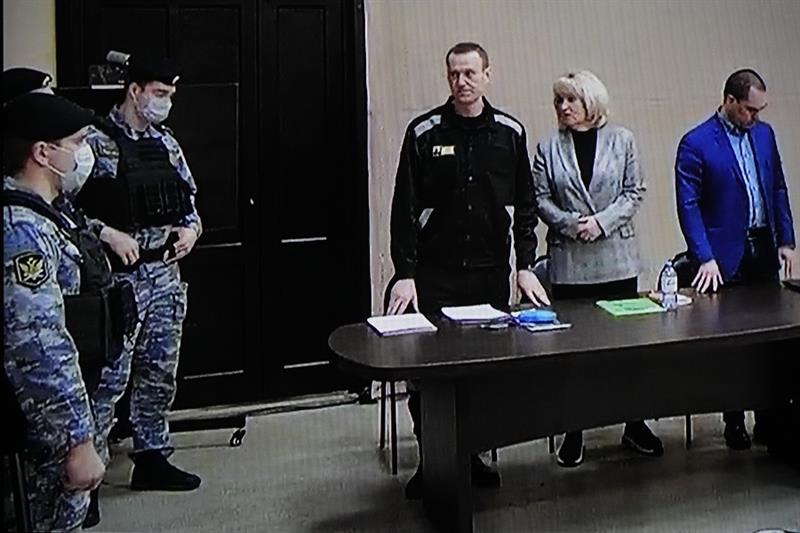
Russian opposition leader Alexei Navalny, centre, is seen via a video link provided by the Russian Federal Penitentiary Service, standing next to his layers during a court session in Pokrov, Vladimir region, about 100 kilometers (62 miles) east of Moscow, Russia, Tuesday, March 22, 2022. AP
A judge also ruled that Navalny would have to pay a fine of 1.2 million rubles (about $11,500). Navalny can appeal the ruling.
Navalny, who is already serving 2{ years in a penal colony east of Moscow, had been accused of embezzling money that he and his foundation raised over the years and of insulting a judge during a previous trial.
The politician has rejected the allegations as politically motivated. The prosecution had asked for 13 years in a maximum security prison for the anti-corruption crusader and a 1.2 million-ruble fine.
The trial, which opened about a month ago, unfolded in a makeshift courtroom in the prison colony hours away from Moscow where Navalny is serving a sentence for parole violations. Navalny's supporters have criticized the authorities' decision to move the proceedings there from a courthouse in Moscow, saying it has effectively limited access to the proceedings for the media and supporters.
Navalny, 45, has appeared at hearings wearing prison garb and made several elaborate speeches during the trial, decrying the charges against him as bogus.
Navalny was arrested in January 2021 immediately upon his return from Germany, where he spent five months convalescing from a poisoning he blamed on the Kremlin, a claim Russian officials vehemently denied. Shortly after the arrest, a court sentenced him to 2{ years in prison over the parole violations stemming from a 2014 suspended sentence in a fraud case that Navalny insists was politically driven.
Following Navalny's imprisonment, authorities unleashed a sweeping crackdown on his associates and supporters. His closest allies have left Russia after facing multiple criminal charges, and his Foundation for Fighting Corruption and a network of nearly 40 regional offices were outlawed as extremist _ a designation that exposes people involved to prosecution.
Last month, Russian officials added Navalny and a number of his associates to a state registry of extremists and terrorists.
Several criminal cases have been launched against Navalny individually, leading his associates to suggest the Kremlin intends to keep him behind bars for as long as possible.
Short link: